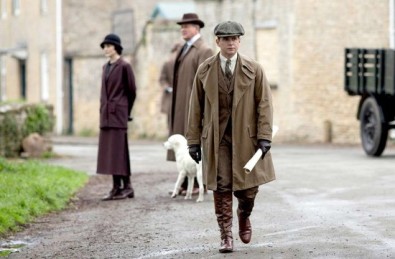The hit TV drama series Downton Abbey returns to PBS on Sunday night (Jan. 4, check local listings for exact time), and the series’s creator, producer, and writer, Julian Fellowes, spoke with The Hollywood Reporter about what the new season will be like. The basics are that season five will consist of eight episodes plus an airing of the show’s annual Christmas special. As to the story lines, the theme of season five appears to be “carry on regardless.”
As viewers of the previous seasons will know, Downton Abbey tells the story of the aristocratic English Crawley family in the 1910s and ’20s, along with various people associated with the family. In the tradition of the great British TV series that set off U.S. viewers’ passion for UK dramas in the 1970s, Upstairs, Downstairs, Downton Abbey also delves into the lives and personal dramas of the Crawley family’s servants.
In the last two seasons’ episodes, several rather dire situations arose, and although most of them have been resolved to a satisfactory extent—meaning, providing sufficient closure to last viewer’s for almost a year before the new season begins—the characters will spend season five dealing with the repercussions of the various plotlines. Those still very much in play include the solvency of the Crawley estate, an investigation into a suspicious death, the fate of an illegitimate child loom large, and several men’s ardent pursuit of Lady Mary Crawley.
As the central characters continue to adjust to the economic, technological, and social changes of the twentieth century, Fellowes laudably avoids conveying a sense of superiority over the people of the past, instead taking a path this is both more honorable and more difficult: getting into the minds of the people of the time and seeing things their way. He expresses this well in the Hollywood Reporter interview:
I think we deal with the changing attitude to sex. I mean, in the 20s, not only was [birth control pioneer] Marie Stopes‘ work becoming better known and the whole business of contraception for women becoming better known and so on, but also you had this whole generation of widows in their 20s. I mean, my grandmother was a widow at 25 because my grandfather died during the war. And my great aunt was a widow at 30 for the same reason. And suddenly there was a mass of these young women of all backgrounds, all classes, who were suddenly widowed, and that created a sort of different kind of sisterhood, which actually was felt in many different areas.
Obviously their political importance and so on, and the demand for the vote built and built, and by ’28, everyone was enfranchised and so on. But also, it did change the attitude toward sex, but you must still leave that in a 1920s context. So Mary, for instance, is slightly freer, but she still must protect her reputation. So you have a mixture of 19th century reputation awareness but 20th century liberation, and I rather enjoyed that.
And you also see the changing structure in the household as jobs start to become amalgamated. There’s no kitchen maid anymore, and different people have to muck in and help with other jobs, and people have to drive, and people have to do this and this and this, because the households were shrinking. And that tremendous definition and departmentalizing that the Victorians adored — where they would have this room for sewing on buttons and that room for taking off lasterplast — I mean, everything was separated. That gradually started to go after the First World War, and of course after the Second, it was really for most people, even at that time, it was largely gone. But that again I find quite interesting is — because we all do it — when people think things are essential until they have to do without them, and then they discover they’re not essential at all.
That, to me, is one of the most satisfying things about Downton Abbey: that it gives due respect to the people of the time, most of whom were simply doing their best to live as well as they could within the limitations of their time and cope with whatever the world sends their way. The best historical fictions have always done that, and in that way Downton Abbey offers both aesthetic pleasure and a greater understanding of both history and human nature.


